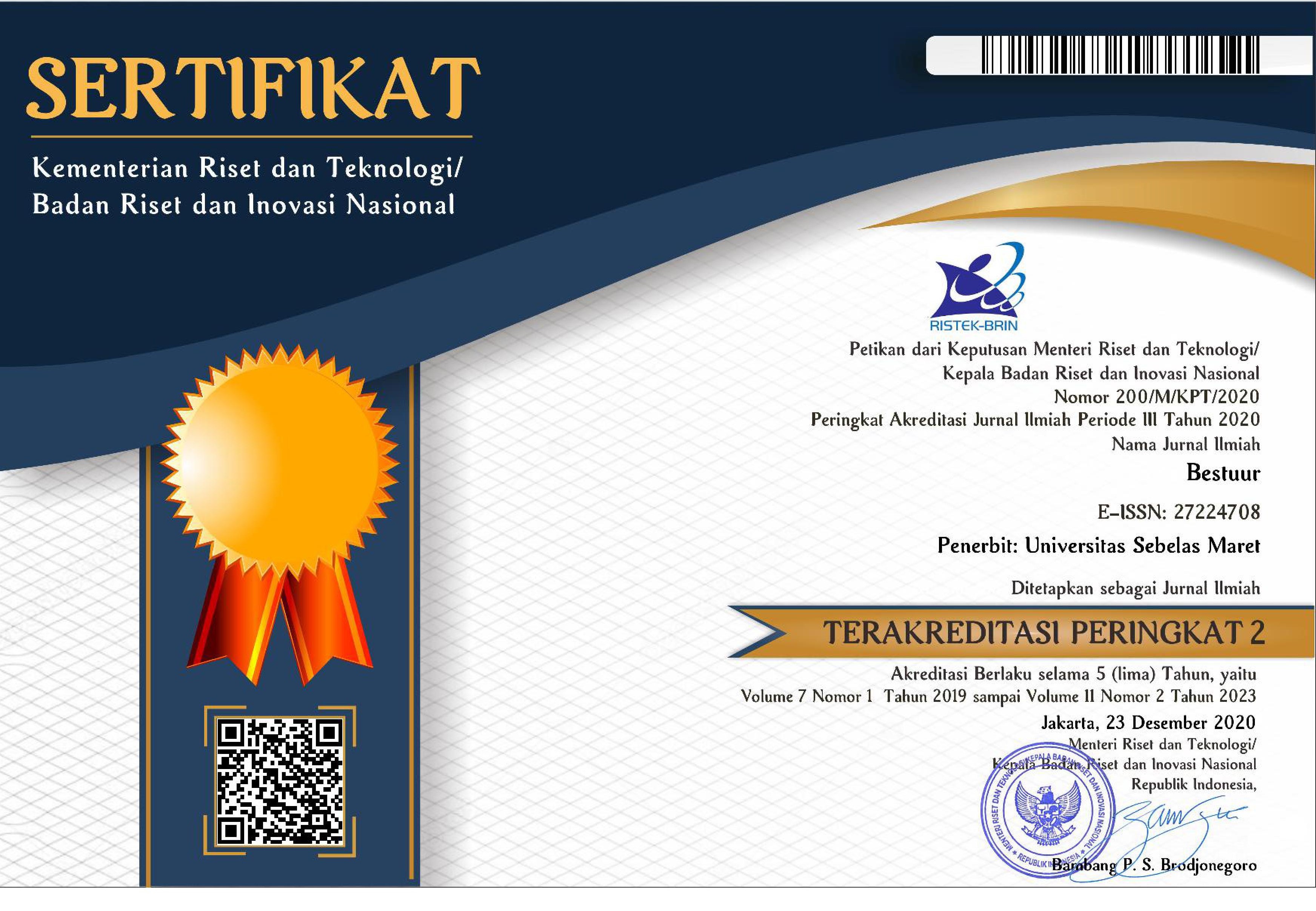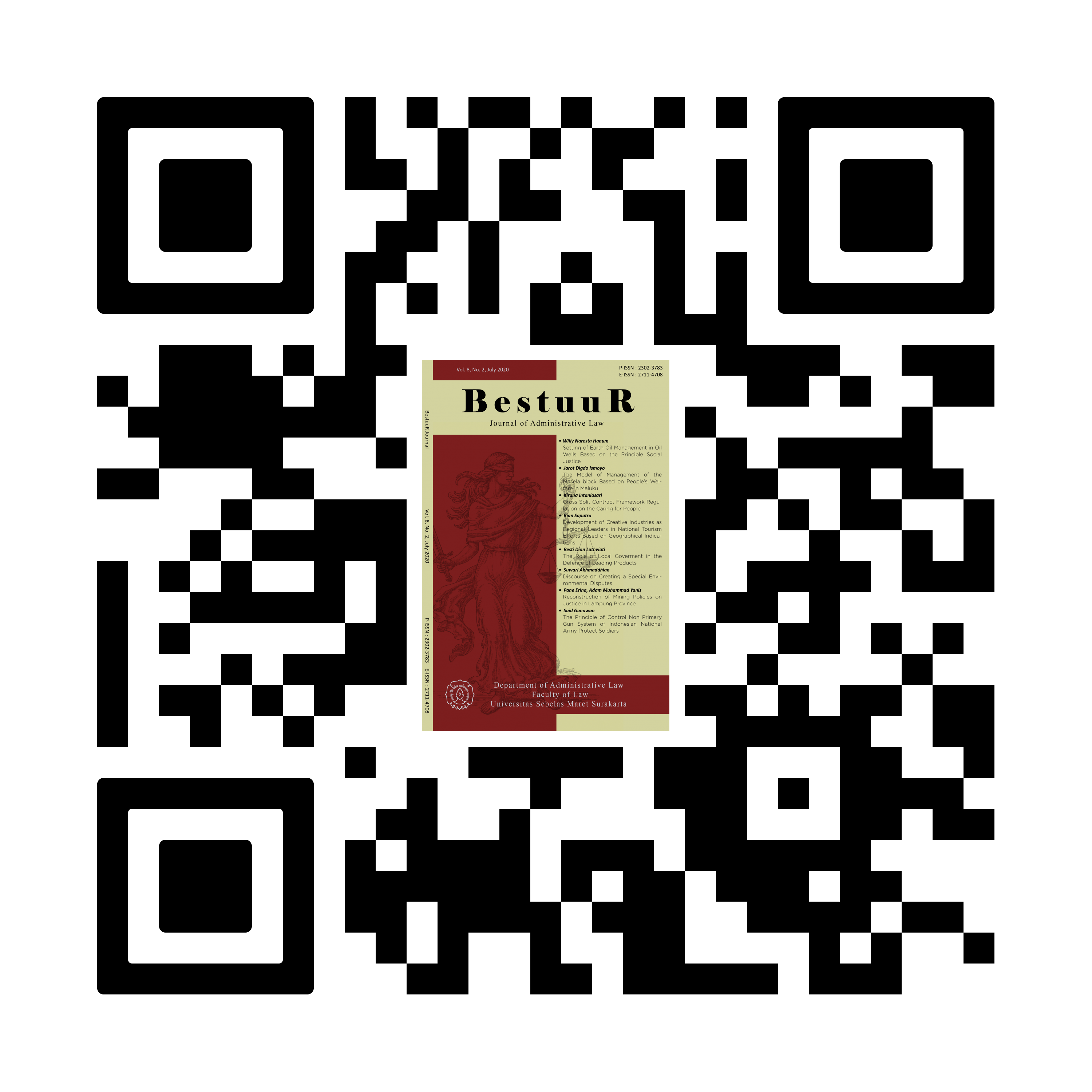Nigeria's Adoption of Robotic Lawyers: Legal and Socio-Economic Challenges
Abstract
Technological advancement has greatly enhanced the global environment, it has improved every facet of the global industry. Currently in Nigeria, the Legal Profession has taken a bold dive by incorporating the use of technology in enhancing the practice of law. However, the current innovation of robotic lawyers in most countries may seem to be consistent with their legal systems. In this regard, it suffices to opine that given the fact that Nigeria is a developing country, there are legal and socio-economic issues that may affect or truncate the adoption of a robotic lawyer in Nigeria. It is in this regard that this study adopted a hybrid method of research in ascertaining the relevance of robotic lawyers, and the legal and socio-economic issues. Questionnaires were distributed to 305 respondent residents in Nigeria. The study found that the current trend of robotic lawyers is quite impressive, however, the nomenclature of law concerning the study and practice of Law in Nigeria does not recognize a robotic lawyer. Furthermore, some socio-economic issues such as internet fraudster, unemployment, insecurity, and poor maintenance culture may pose a challenge to the adoption of a robotic lawyer in Nigeria. In this regard, it was therefore concluded and recommended that for a smooth adoption of robotic lawyers in Nigeria, there is a need for legal approval and streamlining their roles to mere advisory to a client, training of Nigerian lawyers and judges to enhance the legal profession.
Keywords
Full Text:
PDFReferences
Aidonojie Paul Atagamen, Esther Chetachukwu Aidonojie, Ohamire Idemudia Edetalehn, Ikubanni Oluwaseye Oluwayumi and Oyebade Adeniyi, ‘A Facile Study concerning the Legal Issues and Challenges of Herbal Medicine in Nigeria’, The Indonesian Journal of International Clinical Legal Education, 4.4 (2022), https://doi.org/10.15294/ijicle.v4i4.61641
Aidonojie Paul Atagamen, Joseph Nwazi, Eruteya Ugiomo, ‘Illegality Of Income Tax Evasion In Edo State: Adopting An Automated Income Tax System As A Panacea’ Jurnal Legalitas, 16.1 (2023), 62-83 https://doi.org/10.33756/jelta.v16i1.19422
Aidonojie Paul Atagamen, Majekodunmi, T. Afolabi, Ikubanni, O. Oluwaseye and Ibrahim Nathaniel, ‘The causes of the Rising incidence of domestic violence in Nigeria: Proposing Judicial Separation as a Panacea’, Jurnal Hukum UNISSULA, 38(2), (2022), 61-80, https://doi.org/10.26532/jh.v38i2.21592
Aidonojie Paul Atagamen, Okuonghae Nosa and Ukhurebor E. Kingsley, ‘The Legal Rights and Challenges of COVID-19 Patients Accessing Private Healthcare in Nigeria’, BESTUUR, Vol. 10(2), (2022), 183-197, https://doi.org/10.20961/bestuur.v10i2.68118
Aidonojie Paul Atagamen, Oluwaseye Oluwayomi Ikubanni, Alade Adeniyi Oyebade, ‘Legality of EndSARS Protest: A Quest for Democracy in Nigeria’ Journal of Human Rights, Culture and Legal System, 2.3 (2022), 209-224, https://doi.org/10.53955/jhcls.v2i3.40
Aidonojie, Paul Aatagamen, ‘Environmental Hazard: The Legal Issues Concerning Environmental Justice in Nigeria’, Journal of Human Rights, Culture and Legal System, 3(1), (2023), 17-32, https://doi.org/10.53955/jhcls.v3i1.60
Aidonojie, Paul Atagamen, ‘Voluntary Assets and Income Declaration Scheme a Panacea to Tax Evasion in Edo State, Nigeria’, Administrative And Environmental Law Review, 4(1), (2023), 1-20, https://doi.org/10.25041/aelr.v4i1.2822
Aidonojie, Paul Atagamen, and Francis, Esther Chetachukwu, ‘Legal Issues Concerning Food Poisoning in Nigeria: The need for Judicial and Statutory Response’, Jurnal Media Hukum, 29(1), (2022), 65-78, https://doi.org/10.18196/jmh.v29i1.12595
Andrea Bertolini, Pericle Salvini, Teresa Pagliai, Annagiulia Morachioli, Giorgia Acerbi, Leopoldo Trieste, Filippo Cavallo, Giuseppe Turchetti and Paolo Dario, ‘On Robots and insurance’, Int J Soc Robot 8(3), (2016), 381–391. https://doi.org/10.1007/s12369-016-0345-z
Anthon P. Botha, ‘A mind model for intelligent machine innovation using future thinking principles’, J Manuf Technol Manag 30(8), (2019),1250–1264. https://doi.org/10.1108/jmtm-01-2018-0021
Augello, A., Infantino, I., Manfre, A., Pilato, G., & Vella, F. (2016). Analyzing and discussing primary creative traits of a robotic artist. Biologically Inspired Cognitive Architectures, 17, 22–31, https://doi.org/10.1016/j.bica.2016.07.006;
Ayu, Fatma, Jati Putri, and Jasurbek Rustamovich, ‘The Impact of Land Reform Policies on the Sustainable Management of Natural Resources in Local Communities’, Journal of Human Rights, Culture and Legal System, 4.2 (2024), 510–37 https://doi.org/https://doi.org/10.53955/jhcls.v4i2.197
Ayu, I Gusti, Ketut Rachmi, and Jasurbek Rustamovich Ehsonov, ‘Governing Illegal Settlements : Housing Policy in Singapore and Australia’, Journal of Sustainable Development and Regulatory Issues, 2.2 (2024), 86–107 https://doi.org/https://doi.org/10.53955/jsderi.v2i2.44
Baranyanan, Soeleman Djaiz, Nilam Firmandayu, and Ravi Danendra, ‘The Compliance of Regional Autonomy with State Administrative Court Decisions’, Journal of Sustainable Development and Regulatory Issues, 2.1 (2024), 35–52 https://doi.org/https://doi.org/10.53955/jsderi.v2i1.25
Benjamin Alarie, Anthony Niblett, Albert H Yoon, ‘How artificial intelligence will affect the practice of law’, University of Toronto Law Journal, 68, (2018),106–124. https://doi.org/10.3138/utlj.2017-0052
Benjamin Alarie, Anthony Niblett and Albert Yoon, ‘Focus feature: Artificial intelligence, big data, and the future of law’, University of Toronto Law Journal, 66(4), (2016), 423–428. https://doi.org/10.3138/utlj.4005
Brougham Daar and Haar Jone, ‘Smart Technology, Artificial Intelligence, Robotics, and Algorithms (STARA): Employees’ perceptions of our future workplace’, Journal of Management & Organization, 24(2), (2018), 239–257. https://doi.org/10.1017/jmo.2016.55
Canamero Lola. ‘Emotion understanding from the perspective of autonomous robots research’, Neural Networks, 18(4), (200), 445–455. https://doi.org/10.1016/j.neunet.2005.03.003
Castel Stephen, ‘The future decisions of RoboJudge HHJ Arthur Ian Blockchain: Dread, delight or derision?’ Computer Law & Security Review, 34(4), (2018), 739–753. https://doi.org/10.1016/j.clsr.2018.05.011
Cavallo, F., Semeraro, F., Fiorini, L., Magyar, G., Sincak, P., & Dario, P., ‘Emotion modelling for social robotics applications: a review. Journal of Bionic Engineering, 15(2), (2018), 185–203. https://doi.org/10.1007/s42235-018-0015-y
Chris Holder, Vikram Khurana, Faye Harrison and Louisa Jacobs, ‘Robotics and law: key legal and regulatory implications of the robotics age (Part I of II)’, Comput Law Secur Rev 32(3), (2016), 383–402, https://doi.org/10.1016/j.clsr.2016.03.001
David Brougham and Jarrod Haar, ‘Smart technology, artificial intelligence, robotics, and algorithms (STARA): employees’ perceptions of our future workplace’, J Manag Organ 24(2), (2018), 239–257. https://doi.org/10.1017/jmo.2016.55
Fabian Dekker, Jeroen van der Waal and A Salomons, ‘Fear of robots at work: The role of economic self-interest’, Socio-Economic Review, 15(3), (2017), 539–562. https://doi.org/10.1093/ser/mwx005
Filippo Cavallo, Francesco Semeraro, Laura Fiorini, Gergely Magyar, Peter Sinčák and Paolo Dario, ‘Emotion modelling for social robotics applications: a review’, Journal of Bionic Engineering, 15(2), (2018), 185–203, https://doi.org/10.1007/s42235-018-0015-y
Firmandayu, Nilam, and Khalid Eltayeb Elfaki, ‘The Electronic Government Policy-Based Green Constitution Towards Good Governance’, Journal of Sustainable Development and Regulatory Issues, 1.2 (2023), 108–21 https://doi.org/https://doi.org/10.53955/jsderi.v1i2.11
Graham Greenleaf, Andrew Mowbray and Philip Chung, ‘Building sustainable free legal advisory systems: experiences from the history of AI & law’, Comput Law Secur Rev, 34(2) (2018), 314–326. https://doi.org/10.1016/j.clsr.2018.02.007
Hinojo-Lucena Fuss, Aznar Díaz, Cáceres Reche, and Romero Rodríguez, ‘Artificial Intelligence in Higher Education: A Bibliometric Study on its Impact in the Scientific Literature’, Educ. Sci. 9 (2019), 9, 51-63, http://doi.10.3390/educsci9010051
Idahosa, M., Agbale, O., & Aidonojie, P. (2023). The Causes and Legal Implications concerning Assault against Healthcare Providers by Patients or their Relatives in Nigeria. KIU Journal of Humanities, 7(4), 79-88. https://doi.org/10.58709/kiujhu.v7i4.1558.79-88
Idahosa, M., Agbale, O., & Aidonojie, P. (2023). The Causes and Legal Implications concerning Assault against Healthcare Providers by Patients or their Relatives in Nigeria, KIU Journal Of Humanities, 7(4), 79-88. https://doi.org/10.58709/kiujhu.v7i4.1558.79-88
Joanna Bryson and Alan Winfield, ‘Standardizing ethical design for Artificial Intelligence and autonomous systems’, Computer, 50(5), (2017), 116–119. https://doi.org/10.1109/mc.2017.154
Joanna Bryson and Alan Winfield, ‘Standardizing ethical design for Artificial Intelligence and autonomous systems’, Computer, 50(5), (2017), 116–119. https://doi.org/10.1109/mc.2017.154
John Armour and Mari Sako, ‘AI-enabled business models in legal services: from traditional law firms to next-generation law companies?’, J Prof Organ 7(1), (2020), 27–46. https://doi.org/10.1093/jpo/joaa001.
Marcos Eduardo Kauffman and Marcelo Negri Soares, ‘AI in legal services: new trends in AI-enabled legal services’, SOCA 14(4), (2020), 223–226. https://doi.org/10.1007/s11761-020-00305-x
Michael A. Arbib and Jean-Marc Fellous, ‘Emotions: from brain to robot’, Trends Cogn Sci 8(12), (2004), 554–561. https://doi.org/10.1016/j.tics.2004.10.004
Michael A. Arbib and Jean-Marc Fellous, ‘Emotions: From brain to robot’, Trends in Cognitive Sciences, 8(12), (2004), 554–561. https://doi.org/10.1016/j.tics.2004.10.004
Michael Stockdale and Rebecca Mitchell, ‘Legal advice privilege and artificial legal intelligence: can robots give privileged legal advice?’, Int J Evid Proof 23(4), (2019),422–439. https://doi.org/10.1177/1365712719862296
Ming-Hui Huang and Roland T. Rust (2020) Engaged to a robot? The role of AI in service. J Serv Res., (2020), https://doi.org/10.1177/1094670520902266,
Mireille Hildebrandt, ‘Algorithmic regulation and the rule of law’, Philosophical Transactions of the Royal Society, 11 (2018), 376, https://doi.org/10.1098/rsta.2017.0355
Naoki Masuyama, Chu Kiong Loo and Manjeevan Seera, Personality affected robotic emotional model with associative memory for human-robot interaction. Neurocomputing, 272, (2018), 213–225 https://doi.org/10.1016/j.neucom.2017.06.069
Ni Xu and Kung-Jeng Wang, ‘Adopting robot lawyer? The extending artificial intelligence robot lawyer technology acceptance model for legal industry by an exploratory study’, J Manag Organ, (2018), 58-73, https://doi.org/10.1017/jmo.2018.81
Nissan Ephraim, ‘Digital technologies and artificial intelligence’s present and foreseeable impact on lawyering, judging, policing and law enforcement’, AI Soc 32(3), (2017), 441–464. https://doi.org/10.1007/s00146-015-0596-5
Ocana-Fernandez, Y., Valenzuela-Fernandez, L., and Garro-Aburto, L. (2019). Artificial Intelligence and its Implications in Higher Education. Propósitos y Representaciones, 7(2), (2019), 536-568. http://dx.doi.org/10.20511/pyr2019.v7n2.274
Oleg Sali and Denis Pullin, ‘Legal view on the introduction of new technologies’, Russ Law J, 6(3), (2018), 149–171. https://doi.org/10.17589/2309-8678-2018-6-3-149-171;
Pagallo Ugo, ‘Killers, fridges, and slaves: a legal journey in robotics’, AI Soc 26(4), (2011), 347–354, https://doi.org/10.1007/s00146-010-0316-0
Pagallo Ugo, ‘Robots in the cloud with privacy: a new threat to data protection?’, Comput Law Secur Rev, 29(5), (2013), 501–508. https://doi.org/10.1016/j.clsr.2013.07.012
Rismawati, Eka, and Abdul Kadir Jaelani, ‘The Regulation of Foreign Workers as Technology and Knowledge Transfer’, Journal of Sustainable Development and Regulatory Issues (JSDERI), 1.2 (2023), 64–74 https://doi.org/https://doi.org/10.53955/jsderi.v1i2.8
Ronald Yu and Gabriele Spina Alì, ‘What’s inside the black box? AI challenges for lawyers and researchers’, Leg Inf Manag 19(1), (2019), 2–13. https://doi.org/10.1017/s1472669619000021
Taufiqurrohman, A H Asari, Dwi Edi, and Ong Victoria, ‘The Regulation on Sexual Harassment in ASEAN Workers : Evidence from Several Countries’, Journal of Human Rights, Culture and Legal System, 4.2 (2024), 538–68 https://doi.org/https://doi.org/10.53955/jhcls.v4i2.198
Tung Kenneth, ‘AI, the internet of legal things, and lawyers’, J Manag Anal., (2019), 40-52, https://doi.org/10.1080/23270012.2019.1671242
Won-Hyong Lee and Jong-Hwan Kim, ‘Hierarchical emotional episodic memory for social human robot collaboration’, Autonomous Robots, 42(5), (2018) 1087–1102. https://doi.org/10.1007/s10514-017-9679-0
DOI: https://doi.org/10.20961/bestuur.v12i1.89747
Refbacks
- There are currently no refbacks.
Copyright (c) 2024 Paul Atagamen Aidonojie, Obi Eregbuonye, Adesoji Kolawole Adebayo, Shedrack Ekpa, Ketut Sukewati Lanang Putra Perbawa

This work is licensed under a Creative Commons Attribution 4.0 International License.
|











_CROSREF.jpg)




